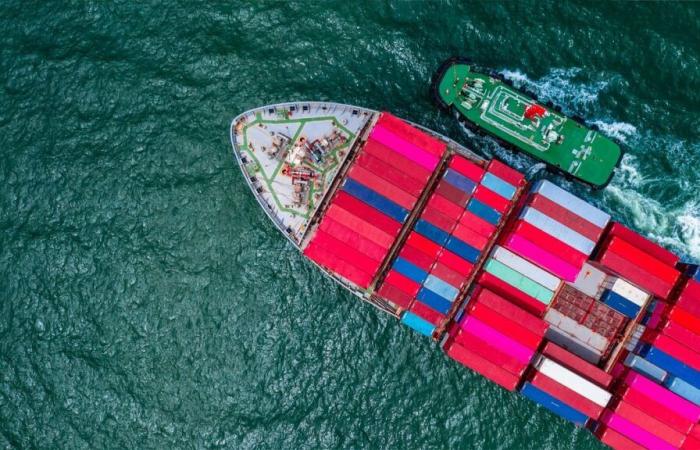Growing tensions between key players such as the United States, the European Union and China have recently led to growing concerns about a global trade war. Kevin O’Marah of community research platform Zero100 speaks on the world’s most pressing trade issues at the World Economic Forum in Davos.
Geopolitical tensions across the world have intensified over the past year, due to ongoing conflicts in the Middle East, as well as a number of important elections in key markets such as the United States. , UK, Germany, EU and India.
The threat of a potential global tariff war has deepened in recent months, after the EU imposed increased tariffs on Chinese imports of electric vehicles (EVs) due to growing concerns over government subsidies. Chinese government to domestic manufacturers.
In turn, China retaliated by opening an anti-dumping investigation into brandy imports from the EU, while also investigating pork and dairy imports from the bloc.
Tariff tensions between the EU and the United States have also intensified and are expected to continue to do so as new US President Donald Trump comes to power. Trump has previously expressed dissatisfaction with EU tariffs on food, auto and agricultural products imported from the United States.
He also threatened to impose blanket tariffs of between 10 and 20 percent on all imports from the EU as soon as he came to power.
Likewise, trade relations between the United States and China are also shaky, mainly due to long-standing disagreements over unfair trade and economic practices, as well as intellectual property theft.
Kevin O’Marah, Research Director and co-founder of Zero100, a community research platform working towards zero carbon, highlights how supply chains are likely to be affected by these changing business conditions and how they adapt accordingly.
O’Marah will speak on the most pressing global trade issues at this year’s World Economic Forum (WEF) in Davos, Switzerland.
What impact could an escalating global tariff war have on supply chains?
An escalation in the global trade war could cause several delays in the supply chain, like the pandemic, which could make it more complex and slower. The cost of importing, exporting and transporting goods across the world could become much higher, which in turn would lead to higher product costs for consumers.
Manufacturers may be forced to find new suppliers and customers, and limit themselves to trading only within certain geopolitical blocs, depending on the magnitude of tariffs.
-On how an escalating global tariff war could affect specific supply chains and industries in markets including the US, UK, Europe and Asia, O’Marah said: “An escalating trade war between the United States and China is likely to isolate critical parts of the market. certain strategic supply chains like electric vehicles, solar power and semiconductors, this is expected to increase costs for all countries, as companies in these value chains must invest domestically to maintain reliable supply.
“The situation will get worse if retaliatory measures and other industrial actions start to intensify. Isolated players, such as perhaps the UK, could paradoxically benefit, as overcapacity in some places, mainly China, could lead to oversupply of certain materials like nickel or components like semiconductors.
“Suppliers with overcapacity, such as manufacturers based in China, may have to sell their products at low prices to third countries. This could help some industries that use these materials and components, but hurt domestic upstream suppliers of these same materials.
“Trump’s tariffs could be a blessing in disguise if they encourage supply chain leaders around the world to localize or at least regionalize their supply chains. The benefit of this change is to provide more resilient but also lower carbon footprint supply chains around the world, rather than sourcing globally and shipping tens of thousands of miles as has been the norm for 30 years of globalization led by the United States and China. »
How do companies build teams to manage supply chain policy?
Several companies have prepared their teams to better manage supply chain issues by investing in training, improving communications with suppliers and customers, and re-evaluating their current supply chain design. Predictive supply chain analytics tools have also helped.
On how companies are building more resilient teams to better deal with supply chain politics, O’Marah said: “Most companies have developed a much quicker ability to model scenarios of what could happen. produce in the event of application of a specific tariff. planning tools and teams to quickly resolve issues have evolved quite a bit after the COVID and supply chain resilience crisis of recent years.
“As a result, very few – if any – are actually stockpiling inventory or significantly shifting their supply commitments to new countries in response to the latest rounds of tariff discussions. Supply diversification outside of China in particular has been underway for years now and so, frankly, most global companies are actually quite prepared to deal with a volatile pricing environment. »
How are artificial intelligence (AI) and robotics transforming supply chains?
Artificial intelligence and robotics have gone a long way in helping supply chains improve operational efficiencies and reduce physical workloads. They can help predict demand in real time and ensure that businesses also manage their inventory better.
Referring to how AI and robotics are transforming supply chains, O’Marah highlighted: “100% digital supply chains would enable businesses to be significantly more responsive and agile in the face of tariffs, which would increase their efficiency and possibly lead to a more widespread use of commercial exchanges. restrictions, industrial policy and other forms of customs duties.
“Supply chain leaders are focused on how AI moves from pilot and experimental to full-scale implementation. The main return on investment lies in radically improving productivity to address labor shortages and rising costs.






